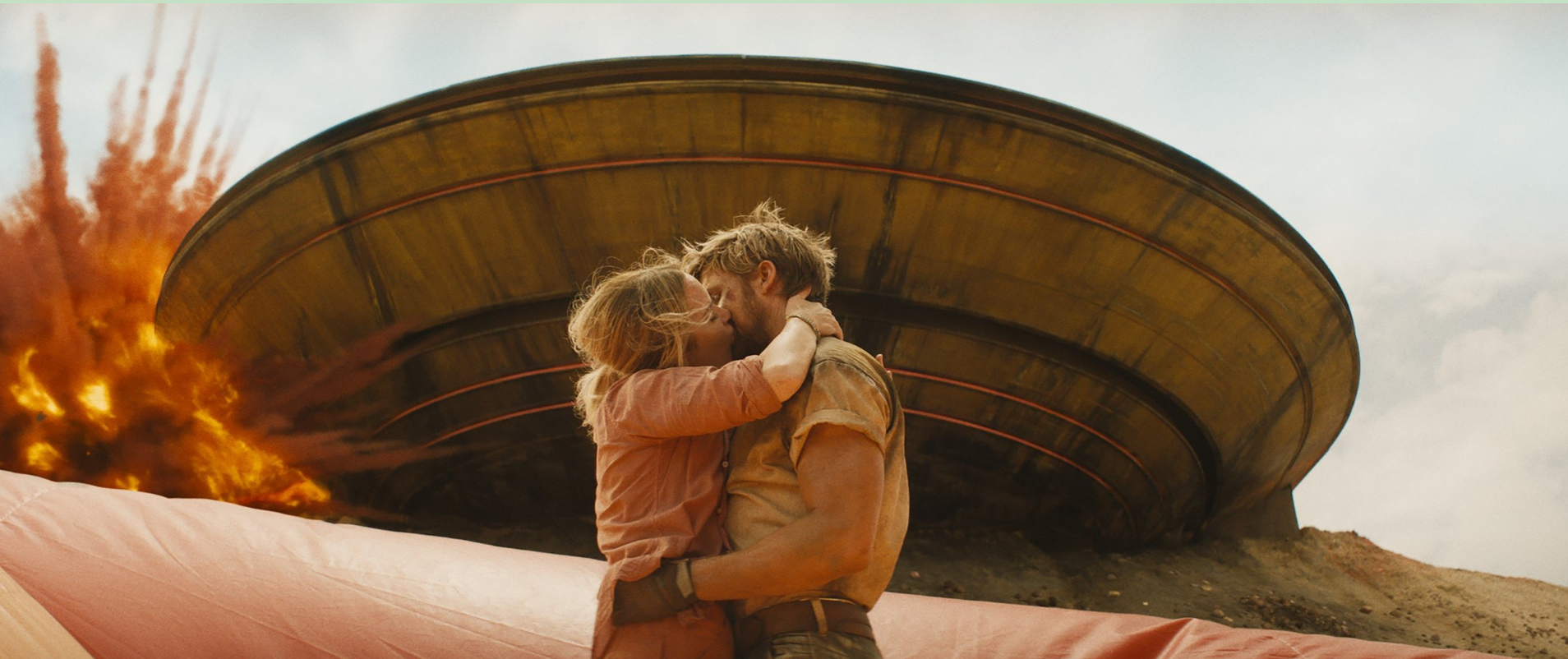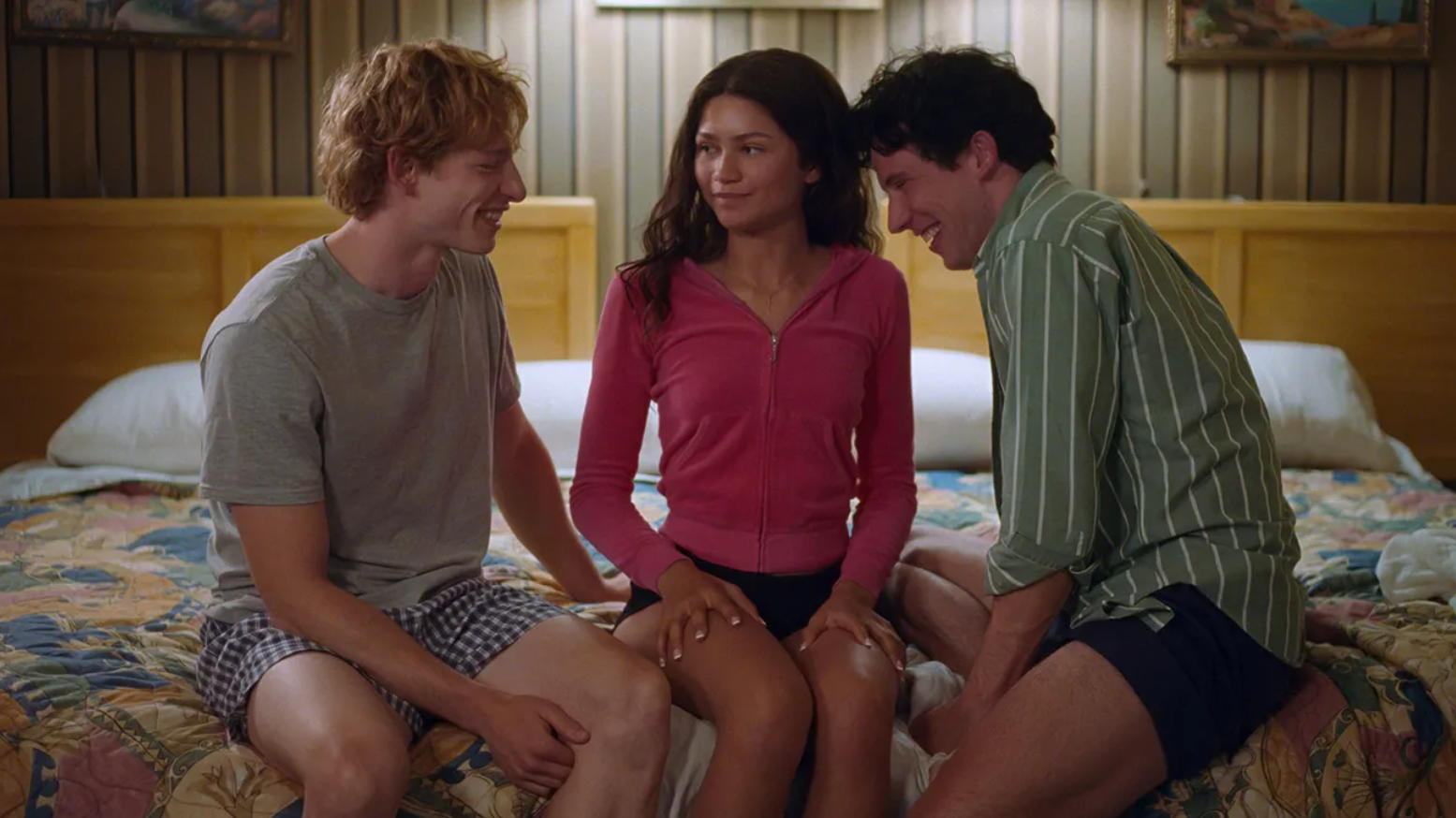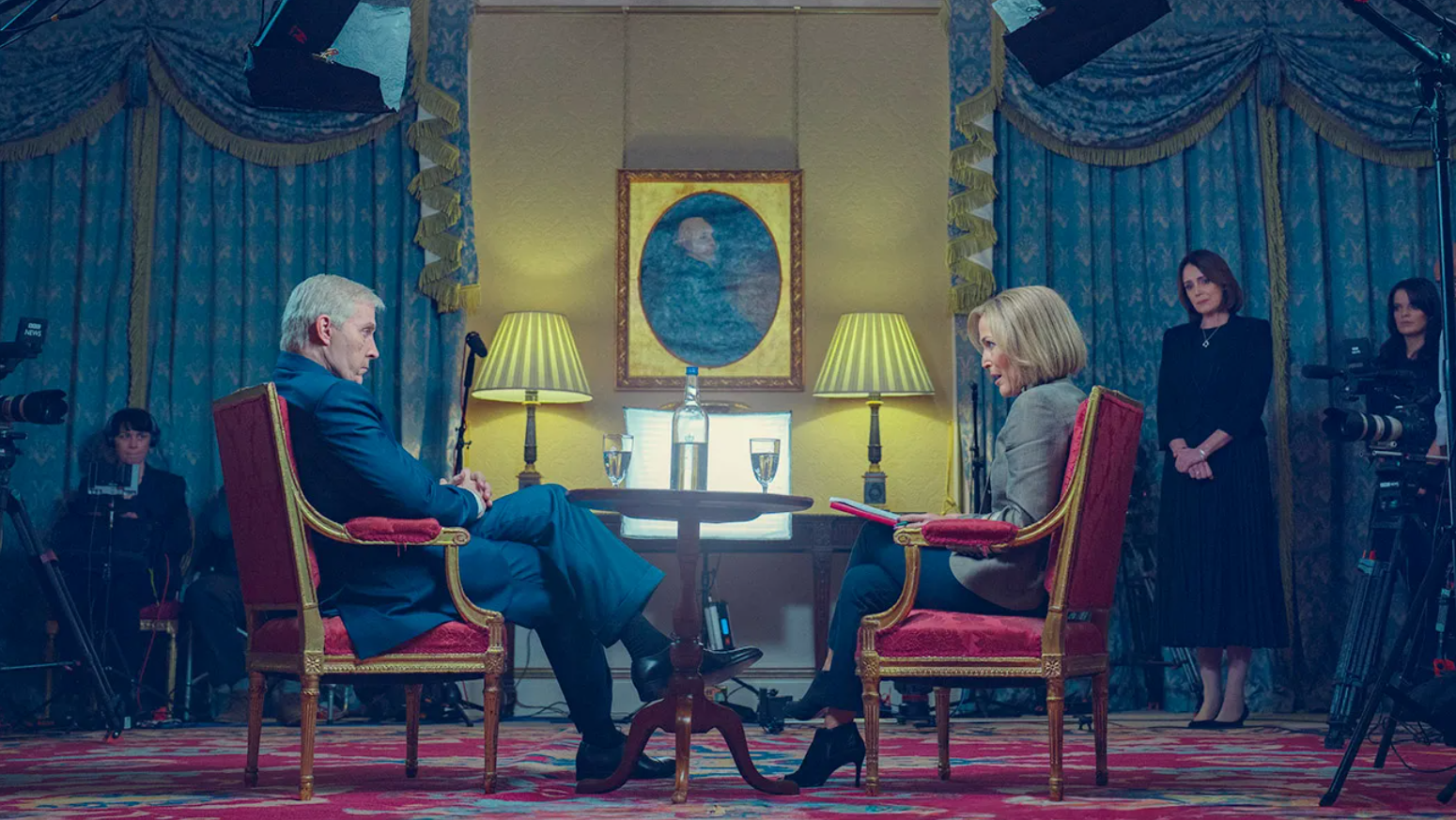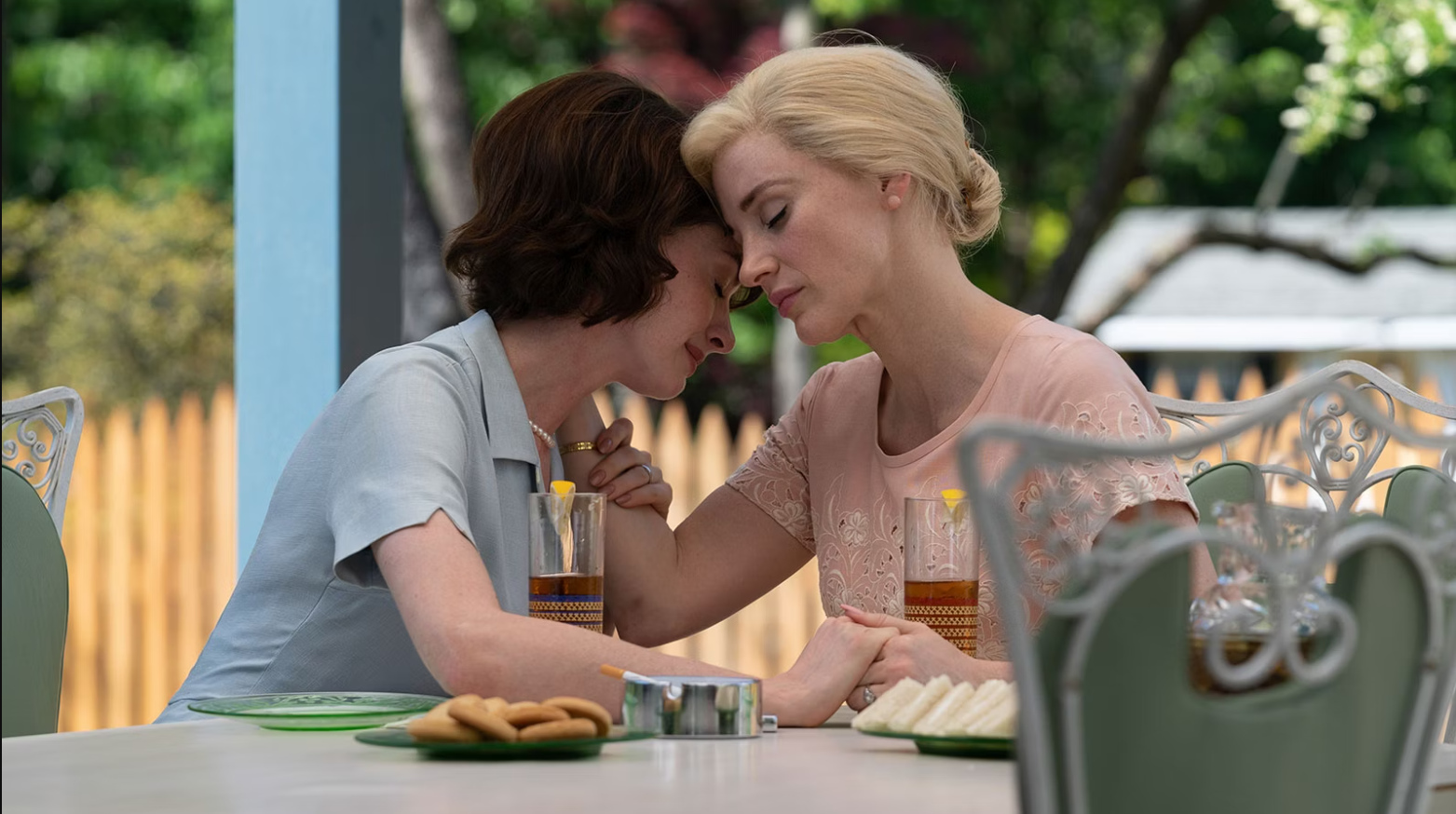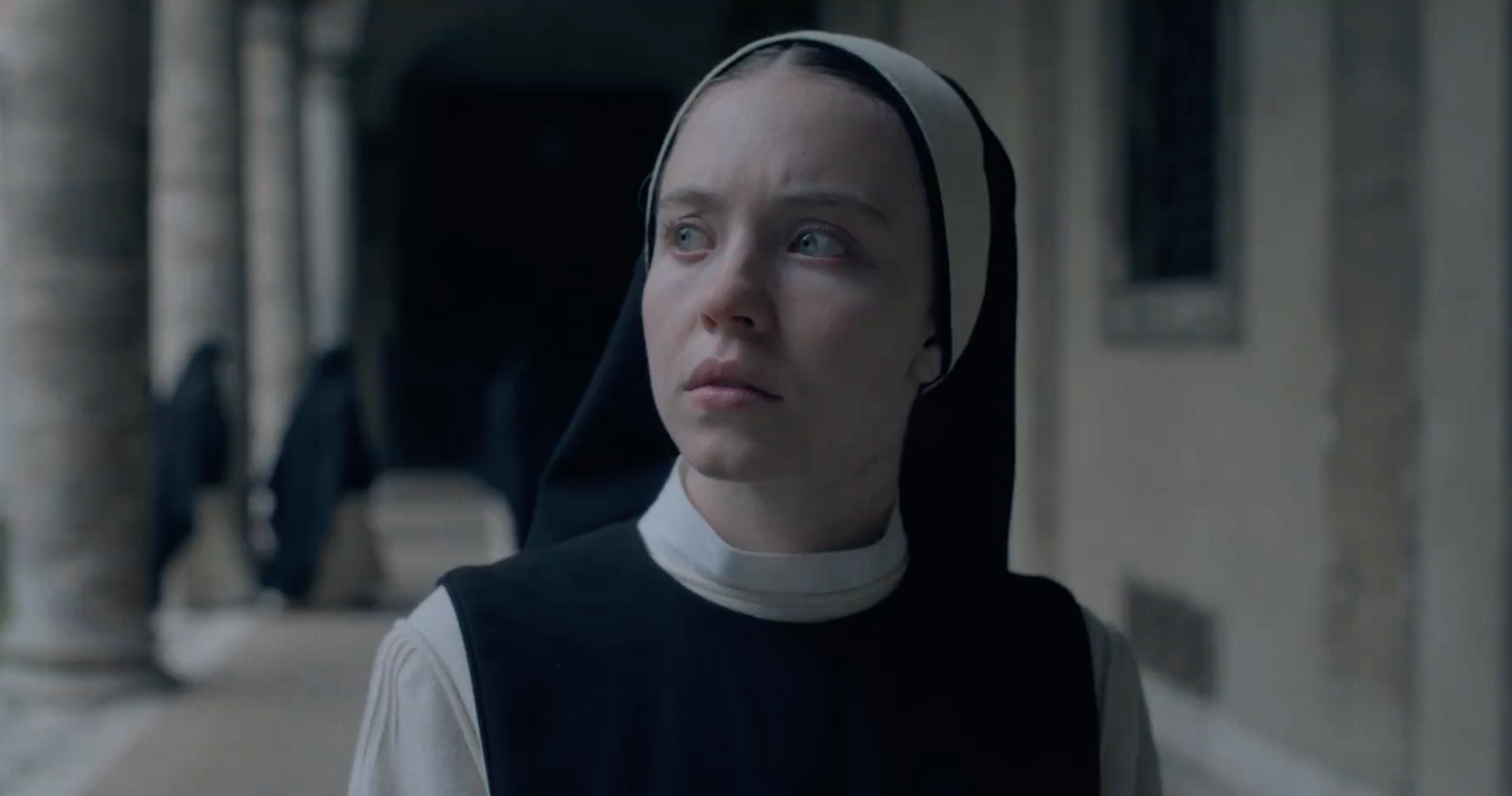Hit Man
Glenn Powell and Adria Arjona ensure there is enough sizzle to keep this odd romcom engaging.
Available on Netflix
Few filmmakers possess a body of work as versatile as that of Richard Linklater. His latest feature is further proof of a pleasing propensity for change that, at the very least, keeps audiences guessing about what’s coming next from a director that has delivered classics as varied as Dazed and Confused, the Before trilogy, and School of Rock.
Hit Man, co-written with leading man Glenn Powell, reinforces Linklater’s interest in narratives that are both stranger than fiction but ingrained in enough everyday ordinariness to be just about believable. In this case, we follow Gary Johnson (Powell), a real-life university professor who moonlit as a fake hitman for the New Orleans Police Department, and his fictitious attempts to save Adria Arjona’s femme fatale.
The role of Johnson is an absolute godsend for Powell, who is able to demonstrate a range that other recent projects such as Top Gun: Maverick and Anyone But You did not elicit. Although his and Linklater’s screenplay flirt with philosophical questions of ego and identity without meaningfully embellishing them, the chameleonic nature of Johnson’s existence gives Powell license to deliver a performance that ensures Hit Man is a more satisfying watch than it perhaps otherwise might have been.
With Arjona also in fine form, there is enough sizzle to this odd romcom to make it an engaging addition to Netflix’s carousel of star-studded summer releases, if little else.
Argylle
Matthew Vaughn and Jason Fuchs’ appallingly bad spy yarn offers a sneak peek of the worst-case scenario for cinema’s future.
Available on Apple TV+
It increasingly feels like the future of cinema - and perhaps culture in general - will be determined by the winner of an existential power struggle between conservators and well-heeled investors. In filmic terms, the most common identity of the latter has been streaming services, a status quo which has yielded inconsistent results at best. Considered in this context, Argylle offers a sneak peek of the worst-case scenario for cinema’s future landscape.
That’s because Matthew Vaughn and Jason Fuchs’ yarn is essentially a case study of the sort of unimaginative filmmaking content creation that cinephiles fear will eventually become the norm. Picked up by Apple for the frankly ludicrous sum of $200 million, it is yet another example of lackadaisical franchising that makes absolutely no attempt to provide its audience with even a modicum of originality, instead assuming that an ensemble cast of disinterested stars will be enough to sustain attention.
Given Argylle’s headache-inducing use of CGI and appalling dialogue, the fact that its star-studded cast collectively delivers career-worst performances is neither here nor there. Ultimately, this is just what happens when studios adopt a paint-by-numbers approach to filmmaking and prioritise profits over artistry.
Furiosa: A Mad Max Saga
George Miller returns to the Wasteland for a prequel that thankfully warrants its existence.
In cinemas now
It’s questionable whether a film as unapologetically high-octane as Mad Max: Fury Road needed a prequel, especially one that doesn’t involve Charlize Theron reprising her show-stealing performance as Imperator Furiosa. However, George Miller is a director that excels at subverting expectations and it’s therefore unsurprising to find that Furiosa, although not quite as unforgettable as its predecessor, more than justifies its existence.
Miller and his Fury Road co-writer Nico Lathouris’ screenplay embellishes not only on the titular protagonist’s backstory but also the hostilities that characterise the Wasteland, where warring tribes vie for control of a post-apocalyptic landscape. One of those clans is led by Chris Hemsworth’s Dementus, a character who, whether by accident or design, manages to steal Furiosa’s thunder by delivering an adversary that is a lot of fun to watch. Hemsworth has long been pigeonholed by his association with the Marvel Cinematic Universe but here provides a reminder of the talents that made him a standout in Bad Times at the El Royale and The Cabin in the Woods.
As for Furiosa, Anya Taylor-Joy does a solid job of filling Theron’s boots, albeit in a role that isn’t necessarily an ideal vehicle for her undoubted gifts. Alyla Browne, on the other hand, is mightily impressive as the fledgling iteration of the character, turning in a performance that belies her status as a child actor. Together, they combine to tell a more emotionally hefty story than Fury Road, one that affords itself more time to breathe (although its runtime proves to be more than a tad indulgent).
With other Fury Road alumnus (including costume designer Jenny Beavan and makeup designer Lesley Vanderwalt), the uniquely feral worldview of the Mad Max franchise is preserved throughout Furiosa, ultimately delivering a summer blockbuster that is worth investing in.
IF
John Krasinski’s latest feature is a well-meaning but uninspiring affair.
In cinemas now
It’s well established that John Krasinski is a man of many talents. He charmed the world with his performance as Jim Halpert in the American iteration of The Office before showcasing his directorial gifts with the daring A Quiet Place and its 2020 sequel. His latest feature IF is something entirely different, a sentimental, family-friendly affair about a young girl (Cailey Fleming) who can see other people’s imaginary friends.
While I don’t think you should ever knock a director for trying something new, Krasinski’s IF is almost the antithesis of his breakthrough hit, it being pretty much devoid of originality. Its premise feels like it has been rescued from the cutting room floor of Monsters, Inc. and its cast, with the exception of the aforementioned Fleming, look and sound as if they are mostly going through the motions. Ryan Reynolds has monopolised the sardonic leading man market since his Deadpool success, but his shtick is becoming borderline lazy.
This aside, IF is not without moments of charm, due largely to the impressive work of its animation and VFX teams. Krasinski has spoken of wanting to create a film that kids can relate to and it’s not implausible to think that he will achieve that modus operandi in most cases, as this is an easily digestible and unchallenging affair. However, the absence of grounding and plausibility from its screenplay means that IF doesn’t live long in the memory and is instead likely to go down as just another forgettable pre-summer affair.
Love Lies Bleeding
Rose Glass’ blood-soaked romance is one of the year’s most impressive films.
In cinemas now
If Rose Glass’ 2019 debut Saint Maud hinted at the emergence of a new auteur, then Love Lies Bleeding affirms that notion via an engrossing and blood-soaked slice of neo-noir. Set during the dying embers of the 1980s, Glass and Weronika Tofilska’s screenplay follows Kristen Stewart and Katy O’Brian’s star-crossed lovers and their attempts to evade the clutches of Ed Harris’ grimy (and wildly coiffured) crime boss.
Thanks in no small part to Ben Fordesman’s cinematography and Clint Mansell’s synth-heavy score, the film perfectly embodies the era in which it is set, with the confines of its rural backdrop effectively operating as a character in its own right. Nonetheless, if this small corner of New Mexico is where dreams come to die, O’Brian’s wide-eyed bodybuilder doesn’t know it, even as she becomes more and more entangled in her spouse’s family drama. Indeed, despite this being her maiden leading role, O’Brian is arguably the MVP of Love Lies Bleeding on account of a performance that manages to be both physically imposing and hopelessly vulnerable.
With Stewart also in dependably excellent fettle, the ingredients are there for one of the sleeper hits of 2024 and a seamless continuation of Glass’ burgeoning directorial career. Comparisons with Ridley Scott’s Thelma & Louise would not be misplaced, but this is a feature that quickly outgrows its influences and assumes its own form as a queer romance that is both hopeful and unapologetically violent. Put simply, it’s a riot.
The Fall Guy
Ryan Gosling reaffirms his status as one of Hollywood’s most dependable leading men in this empty-headed but big-hearted comedy.
In cinemas now
It’s arguable that David Leitch’s The Fall Guy wouldn’t work nearly as well were it not for its casting of Ryan Gosling, Hollywood’s man of the moment, in the lead role. Fresh off the heels of his riotous performance in Barbie, Gosling once again effortlessly assumes the mantle of an undeniably handsome but hopelessly goofy protagonist that will win the affections of his crush at all costs. The fact that said crush is played by the ever-entertaining Emily Blunt just adds to the appeal of this empty-headed and big-hearted blockbuster.
Loosely based on the 1980s series of the same name, The Fall Guy is perhaps best described as a rom-com dressed as an espionage thriller, with Gosling’s character investigating the disappearance of Aaron Taylor-Johnson’s obnoxious leading man (who may or may not be loosely based on Tom Cruise) while also trying to win his ex-girlfriend (Blunt) back. While it is disappointingly light on genuine laugh-out-loud moments, the film demonstrates an endearing admiration for its unsung topic - the stunt man - and is a darn sight more entertaining that many of the action flicks it so lovingly parodies.
Above all else, this is further proof that no leading man is more bankable than Gosling right now, although strong supporting turns from Blunt, Taylor-Johnson, Hannah Waddingham, and Winston Duke certainly aid his cause here.
The Idea of You
Anne Hathaway and Nicholas Galitzine fail to make this misguided rom-com sparkle.
Available on Prime Video
If the idea of this saccharine adaptation of Robinne Lee’s novel is to offer an empowering alternative to the typical depiction of middle-aged women seen in contemporary media, then The Idea of You certainly cannot be accused of having bad intentions.
Nonetheless, it’s questionable how relatable the film’s target demographic will find Anne Hathaway’s near flawless single mother, who appears to be immune to both ageing and the Menopause and capable of effortlessly juggling her parental and professional duties, so much so that she can take her daughter to Coachella at the drop of a hat and embark on a summer-long affair with the frontman of a world-famous boy band. The fact that said affair begins on account of Hathaway’s character mistaking a trailer for a VIP toilet is neither here nor there, but alludes to the absence of logic that is prevalent throughout Michael Showalter and Jennifer Westfeldt’s screenplay.
Hathaway and co-star Nicholas Galitzine certainly bring their best efforts to this drab affair and will doubtlessly hold the attention of viewers with a soft spot for this sort of film, but their chemistry fails to elevate a picture that fails to achieve its mandate. Indeed, you’d be better off avoiding this and giving The Big Sick (one of Showalter’s other films) a watch instead.
Challengers
Luca Guadagnino’s latest slice of flagrant eroticism will polarise viewers but is an undeniably chic, debate-worthy affair.
In cinemas now
Luca Guadagnino’s Challengers is perhaps best described as a Marmite film. For example, my partner was most definitely not a fan, as she felt the film lacked heart and any purpose beyond being an excuse to get its three hot co-leads together for an excessively sweaty, tennis-themed romp. I, on the other hand, enjoyed it for precisely that reason, believing it to be firmly in keeping with Guadagnino’s slightly absurd brand of uber eroticism.
The funny thing is that, when we debated the film’s merits on our drive home, neither of us could really disagree with the other’s observations. I certainly echoed the sentiment that Justin Kuritzkes’ screenplay is a mostly shallow and nonsensical piece of work, one that only ever alludes to the underlying themes that provides its characters’ motivation for their frequently self-destructive actions.
However, it’s easier to overlook this shortcoming when you’re watching a film that is as aesthetically distinctive as Challengers. Whether it’s Guadagnino and Sayombhu Mukdeeprom eliciting memories of the flagrant and persistent titillation of Call Me by Your Name, Trent Reznor and Atticus Ross’ pulsating score, or Jonathan Anderson’s chic costume designs, this is an undeniably alluring film, even if only a superficial level.
On top of that, the lead performances of Josh O’Connor (who is still enjoying the meteoric rise that began with his fine performance in The Crown), Mike Faist, and, in particular, Zendaya ensure this remains an absorbing affair throughout. This certainly feels like a crowning moment for the latter, who assumes the position of femme fatale effortlessly, demonstrating that she has the sort of range that is befitting of a generational star.
While Guadagnino remains a polarising filmmaker, it’s hard to deny that his specific brand of cinema incites debate, which is never a bad thing.
Civil War
Alex Garland’s imperfect dystopian thriller imagines an America that has been ravaged by internal conflict.
In cinemas now
Civil War doesn’t immediately feel like an Alex Garland film.
Its promotional material gave it the veneer of an action flick not dissimilar to Gerard Butler’s Olympus Has Fallen, with its central protagonists seemingly attempting to navigate an America that is devoid of presidential governance. Nonetheless, those familiar with Garland’s filmography will have known to expect more from a writer-director that has delivered features as existential as Annihilation and Ex Machina, and we are subsequently given a thriller that, above all else, serves as a celebration of war correspondents and the lengths they go to document the defining political and social events of today.
With that in mind - and perhaps I’m being overly sensitive here - it feels a little misguided for Garland to be releasing a picture about a fictitious war when conflicts are actually ongoing in Israel, Ukraine, and further afield. Still, if one elects to view Civil War as something of a cautionary tale, especially in a year when Donald Trump is back on the election campaign, it works well enough, thanks in no small part to committed lead performances from Wagner Moura and in particular Kirsten Dunst. There is also a show-stealing cameo from Dunst’s husband Jesse Plemons that simply has to be seen to be believed.
Other elements of Civil War do not work as well, specifically its at times cumbersome pacing and, more pressingly, Cailee Spaeny’s character, who has the irritating habit of making nonsensical decisions that jeopardise the wellbeing of more interesting characters. As proven earlier this year in Priscilla, Spaeny is a fine actor but this role fails to get the best out of her undoubted talents and is to the detriment of the film’s overall credibility.
Still, with frequent Garland collaborators Rob Hardy and Ben Salisbury and Geoff Barrow respectively on DP and composition duties, Civil War still has the hallmark of the sort of ambitious, thought-provoking cinema that this director has come to be known for.
Back to Black
Marisa Abela excels in this otherwise perfunctory Amy Winehouse biopic.
In cinemas now
No genre is arguably as hit and miss as the music biopic. Occasionally, it will deliver something as stellar as James Mangold’s Walk the Line, but generally its outputs are revisionist takes on the lives of deeply complicated individuals. At worst, they can even feel exploitative, especially if the subject is no longer around to tell their side of the story.
Thankfully, that last accusation is not one you could level at Back to Black, which mostly feels like a sincere attempt to celebrate the seldom seen, generational talents of the late Amy Winehouse. It is directed by Sam Taylor-Johnson, whose Nowhere Boy offered an exemplary analysis of the formative years of John Lennon, and features a star-making turn from Marisa Abela, who perfectly embodies the paradoxical mannerisms of Winehouse, who could be every bit as vulnerable as she was recalcitrant.
Abela is joined by a solid supporting cast that includes Eddie Marsan, Jack O’Connell, and Lesley Manville, although its the film’s diligent recreation of Winehouse’s unique live performances that live longest in the memory. Due in no small part to Abela’s impressive vocal performances, Back to Black captures the essence of the rare jazz-pop sound that saw its subject transform into one of the UK’s most successful musical exports.
However, the film suffers from the same unfortunate stage managed approach that made the recent Bob Marley: One Love such a forgetful affair. Given that it was greenlit by Winehouse’s estate, nobody should be surprised to see her father Mitch portrayed in such a sympathetic light, but it’s nonetheless a jarring experience for any viewer who has previously seen Asif Kapadia’s desperately sad 2015 biopic Amy, which was far less sympathetic towards him.
Writer Matt Greenhalgh has previously won plaudits for his 2017 feature Film Stars Don't Die in Liverpool but the end product of this straightjacketed assignment is one that skirts around the issues that sadly defined Winehouse’s life - namely addiction and malevolent associates. While it’s not necessarily a bad thing to disassociate from those sad facts and celebrate her musical legacy, it does render Back to Black a rather hollow endeavour on the whole.
Scoop
Billie Piper and Rufus Sewell elevate this whimsical recreation of Prince Andrew’s infamous Newsnight interview.
Available on Netflix
This dramatic retelling of the BBC’s infamous 2019 interview with the disgraced Prince Andrew is moulded in the image of Ron Howard’s seminal Frost/Nixon, but has an awkward comedic undertone that prevents it from being anywhere near as impactful.
Still, the performances of Scoop’s cast - in particular that of Billie Piper and Rufus Sewell - and its forensic recreation of the aforementioned examination ensure that it remains an enjoyable watch throughout. Piper continues her recent rich vein of form with a compelling portrayal of Sam McAlister, the feisty ‘Newsnight’ booker whose titular 2022 book provides the basis for Peter Moffat and Geoff Bussetil’s screenplay, while Sewell gives us a hefty Andrew that could be mistaken for the less sinister twin brother of Dune’s Baron Harkonnen.
As suggested, the tone of Scoop means that it doesn’t exactly do justice to the victims of Andrew’s deceased pal and general wrongen Jeffrey Epstein, with director Philip Martin instead electing for a lighter approach that perhaps deprives his film of genuine substance. Nonetheless, with Gilian Anderson and Keeley Hawes on support duties, the talent involved means Scoop is worth your time, especially given its breezy runtime.
Monkey Man
Dev Patel’s audacious directorial debut is a revenge thriller for the ages.
In cinemas now
Dev Patel’s audacious directorial debut delivers on a number of different fronts. Firstly, its unapologetically violent action sequences means that it more than lives up to its ‘John Wick in Mumbai’ billing. Patel makes for a convincing action star and clearly has a deeper appreciation and understanding of the genre than most who put their name to it. Courtesy of his direction, Sharone Meir’s gripping cinematography, and Jed Kurzel’s pulsating score, Monkey Man is a revenge thriller for the ages.
However, beyond the film’s technical efficiencies is an even more compelling and impressively daring story that nods to Patel’s Indian heritage and ensures Monkey Man is a far more soulful affair than many of its other genre counterparts. Indeed, the socio-political commentary of its screenplay, which Patel co-wrote with Paul Angunawela and John Collee, was enough to make Netflix shop it around to other buyers, a decision that eventually led to the involvement of Jordan Peele’s Monkeypaw Productions.
We all ought to be grateful for that rescue act because Monkey Man is that most refreshing of pictures, one that features a diverse cast and an original concept that educates viewers on issues that they might otherwise be blind to (in this case, the ongoing corruption associated with India’s caste system). Put simply, it is a most impressive opening salvo from a star that clearly lives and breathes his craft.
The Trouble with Jessica
Matt Winn’s social satire fails to make the most of the talent at its disposal.
In cinemas now
There is a touch of An Inspector Calls about Matt Winn’s social satire. The Trouble with Jessica, co-written by Winn with James Handel, sees Shirley Henderson and Alan Tudyk host one final dinner party in their idyllic North London home, which they are reluctantly selling in order to resolve their self-inflicted financial woes. Their guests are two long-time friends, played by Rufus Sewell and Olivia Williams, and Jessica (Indira Varma), an errant acquaintance who soon turns the evening on its head by committing suicide in their garden.
What ensues is a slapdash attempt to conceal the body from a slew of unexpected visitors and then move it to Jessica’s apartment, so that the tragic turn of events does not affect the impending sale of the house. As you might expect, The Trouble with Jessica is a very well acted affair (Henderson and Sewell are particularly entertaining) that expertly parodies British suburbanites, but it frustratingly fails to deliver on an intriguing premise, eventually indulging in one too many twists and leaving you feel unfulfilled and a tad frustrated.
Winn and Handel’s screenplay is also unfortunately light on laughs, which is a crying shame when you consider the comedic talent involved, leaving you wondering whether it might have worked better as the sort of theatre production that it is so clearly indebted to.
Taylor Swift: The Eras Tour (Taylor's Version)
This money-spinning concert film underlines Taylor Swift’s credentials as one of the most unique artists of her generation.
Available on Disney+
Whether you like it or not, Taylor Swift is one of the most preeminent musicians alive today, an era-defining artist that has grown in stature over the duration of her circa 20-year career. Her record-breaking Eras Tour, which arrives in the UK in June, proves this in a number of ways.
Firstly, the origins of this concert film are befitting of a creative that is looking to leave a mark on their industry, with it coming courtesy of an unprecedented distribution agreement with AMC and Cinemark. This was followed by an unconventional release strategy that prompted a host of distributors to alter the opening date of several properties to avoid having to go toe-to-toe with T-Swizzle. Their apprehension proved to be well founded, with The Eras Tour racking up more than $100m in global pre-sales.
Although that figure is mightily impressive, it pales in comparison to a final take of $261.7m, which distinguishes this as the highest-grossing concert film of all-time. Though much of this success is due to Swift’s cross-generational appeal, it does reaffirm the potential of the medium in a time when the cost of gig tickets are soaring exponentially.
The length and structure of the show also demonstrates Swift’s propensity for doing things a little differently to her peers, with it running for almost three and a half hours and incorporating 10 distinct acts, each of which represent a different era of her career. While not all of these will appeal to more nonchalant viewers such as myself, they do effectively showcase a singer-songwriter that has fastidiously evolved their image and sound over time, with the Red, Folklore, and 1989 acts firmly underlining her credentials as a pop behemoth for the ages.
What is most refreshing about The Eras Tour, and indeed Swift as a performer, is that it is a consciously uncomplicated affair. In contrast to Beyoncé’s powerful and defining Renaissance, it features no soundbites from its star that explain the motivations behind her work, instead preferring to let the music do the talking. While this might expose Swift to characterisations of her and her team being overly cash-oriented, it’s hard not to be enamored by her pure and almost goofy stage presence, which speaks to someone who loves her craft and is undeniably a master of it.
Mother’s Instinct
Anne Hathaway and Jessica Chastain fail to elevate this familiar psychological thriller.
In cinemas now
There is a point during Benoît Delhomme’s psychological thriller, a remake of Olivier Masset-Depasse's original feature, where you wonder whether you might be watching something far less conventional than what Mother’s Instinct ends up being. The film, which is based on a 2012 novel written by Barbara Abel, is focused on two suburban housewives (played by Anne Hathaway and Jessica Chastain) whose friendship begins to unravel in the wake of a tragedy involving one of their children.
At the film’s midpoint, Chastain’s character becomes convinced that her friend has hatched a seemingly improbable scheme to punish her for failing to prevent this catastrophe, despite there being scant evidence to support her claims. This briefly raises an interesting question about the effects of grief on those who bear witness to it, even if they are not bereaved themselves, as well as the inherent anxieties of motherhood.
However, Delhomme’s film quickly disposes of such introspection in favour of a more familiar final act whereby its two leading ladies find themselves on a fatal collision course. While Anne Nikitin’s nail biting score and a typically committed performance from Chastain ensure this makes for a somewhat gripping denouement, it does render Mother’s Instinct a more perfunctory affair than it could have otherwise been.
Immaculate
This Sydney Sweeney star vehicle effectively showcases its star’s range, but is an otherwise predictable slice of horror schlock.
In cinemas now
Sydney Sweeney’s rise to fame has been meteoric since her breakthrough role in HBO’s racy teen drama Euphoria. After showcasing her comedic chops in season one of The White Lotus and excelling in Tina Satter’s claustrophobically tense Reality, she makes her horror bow in Michael Mohan’s Immaculate, presumably in an attempt to underline her credentials as a leading lady for all occasions.
Co-produced via Sweeney’s production company Fifty-Fifty Films, Immaculate is evidently a star vehicle that aims to showcase its leading lady’s range and, in that sense alone, it works well enough. Sweeney fully embraces her role as a nun that quickly discovers the remote convent she has joined is harbouring malevolent secrets, as demonstrated by the film’s bloody final act.
However, Andrew Lobel’s formulaic screenplay means the clandestine plot of Immaculate is actually far from shocking, but rather the latest in a seemingly endless conveyor belt of ‘evil nun’ movies. While the film is clearly indebted to genre classics such as Rosemary’s Baby and The Omen, it is closer in execution to more recent bedfellows such as last year’s senseless Evil Dead Rise, with predictable jump scares and violence taking precedence over character or plot development.
While Sweeney’s undoubted star power ensures Immaculate remains watchable throughout, it isn’t enough to stop it from being almost entirely forgettable.
Late Night with the Devil
David Dastmalchian takes centre stage in the Cairnes brothers’ suspenseful found-footage horror.
In selected cinemas now
There is a deliberate kitschiness to Late Night with the Devil that has the paradoxical effect of distinguishing Cameron and Colin Cairnes’ horror as a film of substance. Written and directed by said Australian siblings, the picture combines a found footage approach with impressively diligent production design to depict a live broadcast of a fictional 1970s late-night talk show that goes horribly wrong.
David Dastmalchian, long established as one of Hollywood’s most dependable supporting actors, thrives in the lead role of Jack Delroy, who goes to extreme lengths to boost ratings of his show ‘Night Owls’. He nails the self-satisfied, unapologetically cheesy allure that typically characterised the talk-show hosts of the 70s, before elevating the dramatic impact of his performance to coincide with Late Night with the Devil’s disorienting crescendo.
While the film doesn’t offer much in the way of genuine shocks, it remains a suspenseful watch throughout and certainly distinguishes the Cairnes as a distinctive voice within the genre.
Drive-Away Dolls
Ethan Cohen and Tricia Cooke’s lesbian road trip comedy is neither as entertaining or sexually liberated as it thinks it is.
In cinemas now
Few directors are as synonymous with the crime caper as the Coen brothers, which means that Drive-Away Dolls is hindered by expectation from its outset.
The film is Ethan Cohen’s second as a solo director and akin to some of his and brother Joel’s more puerile work such as Burn After Reading and O Brother, Where Art Thou? Co-written with his wife Tricia Cooke (who Cohen has described as the picture’s co-director in all but name), Drive-Away Dolls is ostensibly a road trip tale that is focused on two young lesbians (played by Margaret Qualley and Geraldine Viswanathan) whose attempts to elope to Tallahassee quickly become entwined in the machinations of a group of dim-witted criminals.
It’s clear to see that, on aesthetics alone, this is intended as a homage to a specific sub-genre of filmmaking (John Waters has been cited as an inspiration) and that Cohen and Cooke are attempting to make a picture that is both entertaining and sexually liberated. The problem is that Drive-Away Dolls is neither.
Despite the best efforts of Qualley and Viswanathan (who have respectively excelled in projects such as Maid and Blockers), the screenplay is light on laughs and tries far too hard to be audacious, instead coming across as exactly what it is - an attempt by two middle-aged people to imagine how young queer people have sex. Even cameos from Matt Damon, Miley Cyrus, and Pedro Pascal fail to save the day.
It’s perhaps unsurprising to learn that Drive-Away Dolls was originally announced in 2007, as it has the feel of a project that has been in development limbo for some time. Given how underwhelming the final output is, it’s hard to dispute the notion that it’d have been better off left there.
20 Days in Mariupol
Mstyslav Chernov’s harrowing documentary is essential viewing in today’s age of disinformation.
Available on 4OD and Dogwoof
Mstyslav Chernov’s Academy Award winning documentary offers a distressing and unflinching look into the early throes of Russia’s invasion of Ukraine, specifically its siege and eventual capture of the strategic port city of Mariupol. Chernov, a respected war correspondent, gathered the footage for 20 Days in Mariupol on the ground alongside colleagues from the Associated Press (AP) and Public Broadcasting Service (PBS) while covering the first 20 days of the incursion, sending material from the only place in the city where an online connection remained.
As one might expect, the film is a difficult watch that is replete with images that are almost too harrowing to conceive. Both Chernov and his interviewees are at pains to demonstrate the scale of this conflict and the senseless loss of life it has caused, going as far to air scenes as heartbreaking as the death of an infant and the construction and filling of mass graves.
At times, I questioned whether it was appropriate for such tragedies to be made available for public consumption, but Chernov counterbalances this by including excerpts from Russian news coverage of the conflict which denies wrongdoing and denounces the work of AP, PBS, and other such outlets as Western propaganda.
In that sense, the power of 20 Days in Mariupol can be found in how it reinforces the importance of the work of correspondents such as Chernov, particularly in the disinformation age. AP was the first to document Russia’s bombing of a Mariupol maternity hospital - a war crime which they denied committing - and this and other such footage fully exposes the callousness of Vladimir Putin’s operation.
Indeed, in light of the autocrat’s latest election victory, brave and dissenting voices such as Chernov and Yulia Navalnaya are more essential than ever. You won’t want to revisit 20 Days in Mariupol, but you’ll be more enlightened for having seen it.
Lisa Frankenstein
Zelda Williams evokes peak John Hughes in her enjoyable feature debut.
In selected cinemas now
At some point in our life, we have (probably) all uttered that timeless adage of ‘they just don’t make films like this anymore’. For me, this is usually when I’m watching comedy classics from the 1980s through to the early 2000s, as I feel that crowd-pleasing comedies have mostly become extinct in today’s cinematic landscape.
Enter Lisa Frankenstein, the feature debut from director Zelda Williams that follows Kathryn Newton’s Lisa Swallows as she navigates high school while dealing with some psychopathic tendencies and her new-found relationship with a zombie (Cole Sprouse).
The look and feel of this film is incredibly unique, with the production design and camerawork immediately transporting you back to the world of 1980s American cinema. The colours pop, the outfits rock, and the lead performances compliment this aesthetic perfectly. Indeed, Lisa Frankenstein evokes the style of a John Hughes movie, which makes it an absolute treat for viewers who, like me, have a taste for the unabashedly cheesy. Crucially, the 80s setting never feels cheap as the film, much like The Holdovers, actually feels like it hails from that era.
The style of humour is also pretty dark, which I greatly appreciated. If you love the humour in something like Heathers, you’ll definitely appreciate this. There are some one-liners that will absolutely stick around in my head for the foreseeable future and one scene in particular that will go down as one of my all time favourites.





